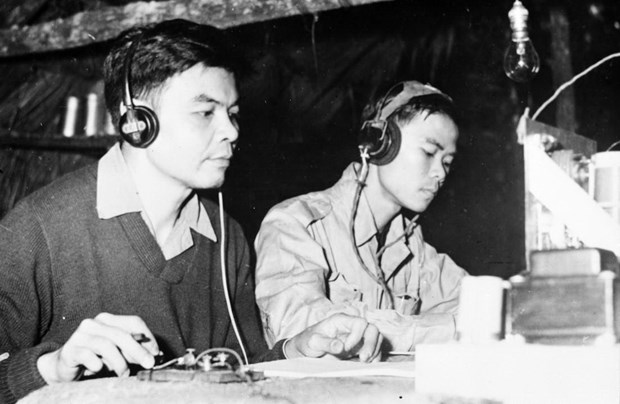
Technicians of the Liberation News Agency worked during the anti-American resistance war (Photo: VNA)
State President Nguyen Phu Trong signed a decision to this effect on September 1. This is the third time VNA has been awarded the title.
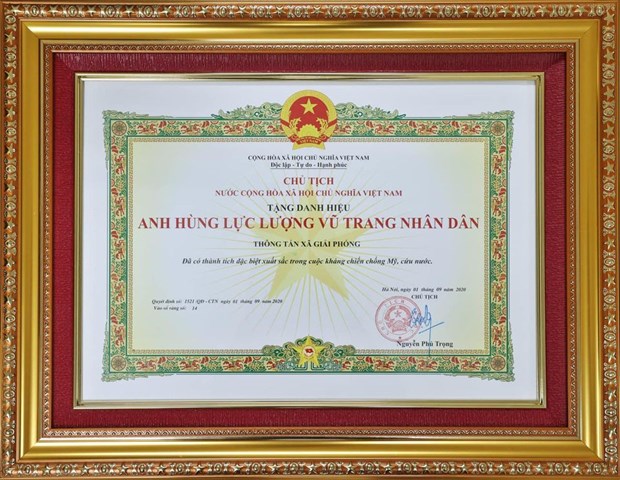
The decision to award the Hero title to the Liberation News Agency signed by State President Nguyen Phu Trong (Photo: VNA)
Official mouthpiece of the National Front for the Liberation of South Vietnam
The Liberation News Agency was officially established at the Duong Minh Chau revolutionary base in the southern province of Tay Ninh on October 12, 1960. The agency played a vital role throughout the anti-American resistance war, performing its task of covering historic events while directly participating in the fight and contributing to national reunification.
In preparing for the announcement of the birth of the National Front for the Liberation of South Vietnam and to meet new requirements and tasks of the revolution in the south, the agency sent out its first news bulletin on October 12, 1960 from Chang Riec Forest in Tay Ninh.
The agency stated in its debut announcement that “The Liberation News Agency is the official mouthpiece and news agency of the National Front for the Liberation of South Vietnam, and has the duty of disseminating news and diverse combat experience of people all over the country, and reflecting the increasing power of the revolutionary movement as well as the collapse of the ruling regime in the south.”
Two months after its inception, the Liberation News Agency reported the founding of the National Front for the Liberation of South Vietnam, on December 20, 1960. Since then, it had been regarded as the official mouthpiece of the front.
The agency delivered news to Hanoi daily at 6 pm and became an indispensable source of information for many press agencies in both Vietnam and abroad.
Growth amid hardships
Despite facing a host of difficulties in human resources and technical equipment, the Liberation News Agency developed continuously in both organisation and personnel.
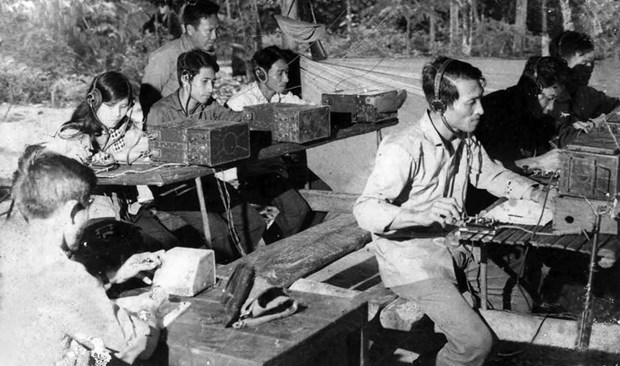
The technical section of the Liberation News Agency at the Duong Minh Chau revolutionary base (Photo: Liberation News Agency)
In organisation, the agency’s headquarters was initially located at the Duong Minh Chau military base in Tay Ninh while bureaus were set up in areas throughout the south. It experienced significant changes in the numbers of reporters, editors, and technicians, as many were killed while performing their duties. Its staff expanded rapidly after 1965, reaching 441 by the end of 1974.
With the slogan “non-stop wave” and with only a few 15W transmitters at hand, the Liberation News Agency worked on improving its technical equipment with support from various other sources. It had the best technical facilities and boasted the highest level of security among revolutionary press agencies in the south at the time.
During its over 15 years of operations, between 1960 and 1975, the Liberation News Agency had to move its headquarters dozens of times due to the enemy’s bombings, from the revolutionary base in Tay Ninh (1960) to Ma Da (Dong Nai) in the D revolutionary base (early 1961), the area bordering Cambodia and even in Cambodia as the US expanded the war (1971), and then back to Tay Ninh again following the signing of the Paris Peace Accords in 1973. Its southern bureaus were also moved constantly due to attacks by US and US-backed forces. There were bureaus that had to be re-established and moved to other locations after their entire staff were killed.
Despite the hardships and difficulties, the agency was a pioneer in information and communications work from the time it was established until its merger with the Vietnam News Agency in 1976. It played the core role within the revolutionary press in the south during the anti-American resistance war and the initial period of the country’s post-war reunification.
Completing historic, glorious mission
As the official mouthpiece of the National Front for the Liberation of South Vietnam and then the Provisional Revolutionary Government of the Republic of South Vietnam, the Liberation News Agency provided accurate information and became a sharp and powerful revolutionary weapon, contributing significantly to glorious victories by the nation towards national reunification.
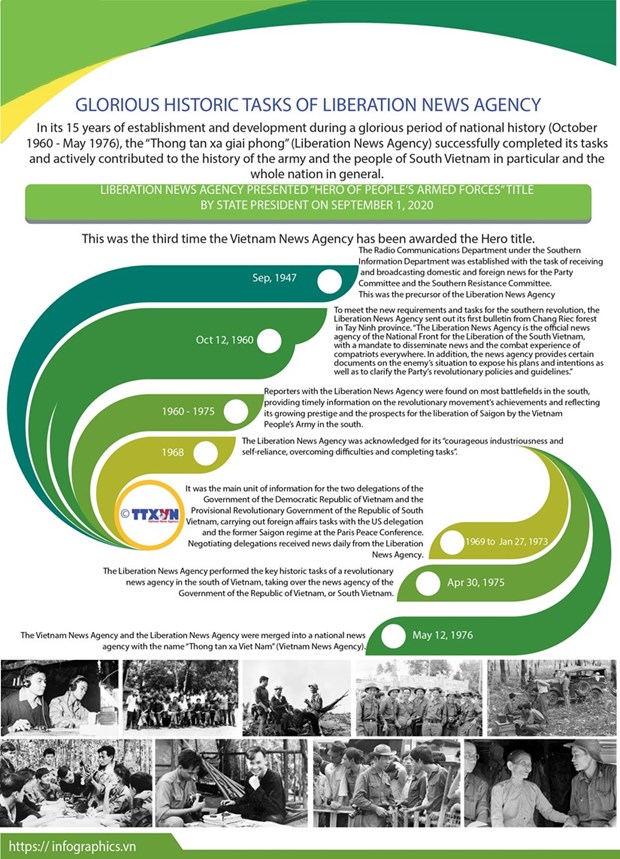
(Infographic: VNA)
The Liberation News Agency kept the information flow running unceasingly, as its reporters found themselves in most southern battlefields and provided breaking news and photos for domestic and foreign press agencies. The Party’s Central Office for South Vietnam analysed the situation based on the agency’s news articles and photos, making strategic decisions and giving timely instructions on the battlefield.
The agency’s reporters were found on all battlefields and images of them working amid bombs became familiar among those joining the battle as well as domestic and foreign press agencies.
Its reporters were the first to appear at sites marking victory for the revolution in 1975.
On April 30, 1975, the Liberation News Agency took over Viet tan xa - the news agency of the US-backed administration in southern Vietnam.
The agency performed its information task in an outstanding manner and directly joined the struggle with a great feat of arms and sacrifice, completing its glorious historic mission.
May 24, 1976, was a historical date for the revolutionary news sector, as the Liberation News Agency was merged with the Viet Nam Thong Tan Xa. On May 12, 1977, Viet Nam Thong Tan Xa was renamed Thong Tan Xa Viet Nam (Vietnam News Agency), joining in national efforts in the new period of building and defending socialist Vietnam.
VNA’s representative offices in the south and the central-Central Highlands region have been tasked with managing and instructing the activities of offices and units in the areas once covered by the Liberation News Agency. Those regional offices have carried forward the glorious traditions of the Liberation News Agency to contribute to the development of the VNA, making it deserve the role of the strategic information centre of the Party and the State./.
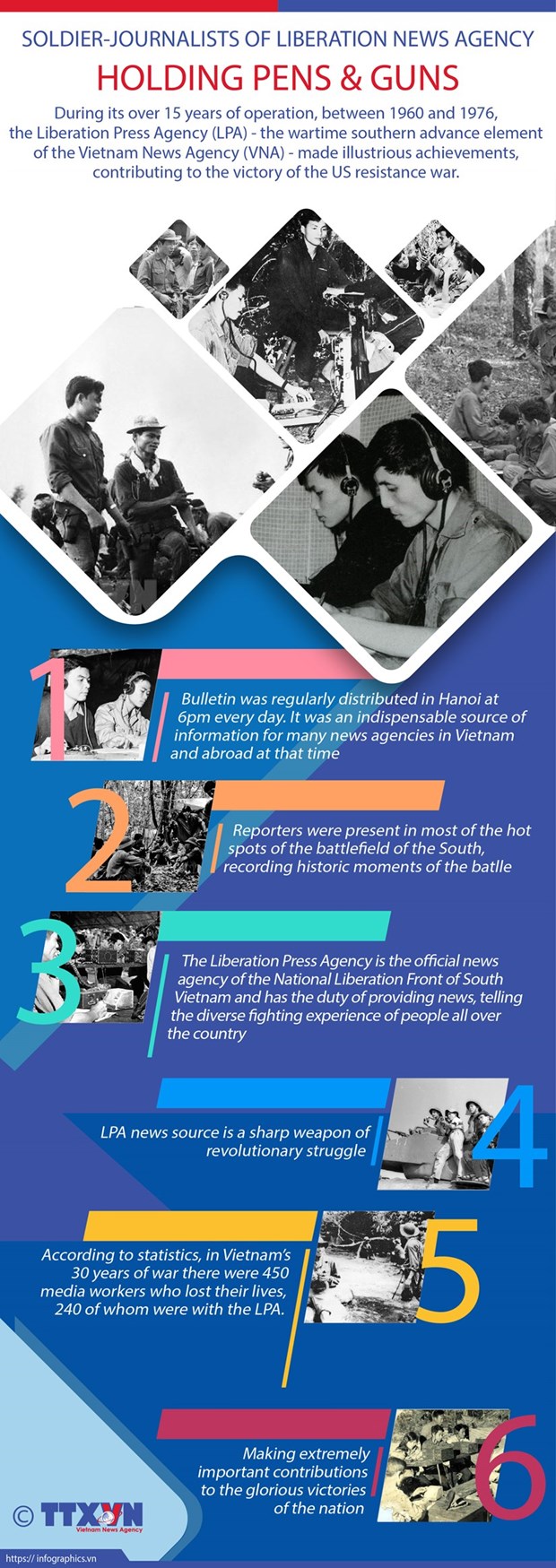
(Infographic: VNA)
VNA
 Mekong Delta provinces step up crackdown on IUU fishing
Mekong Delta provinces step up crackdown on IUU fishing







